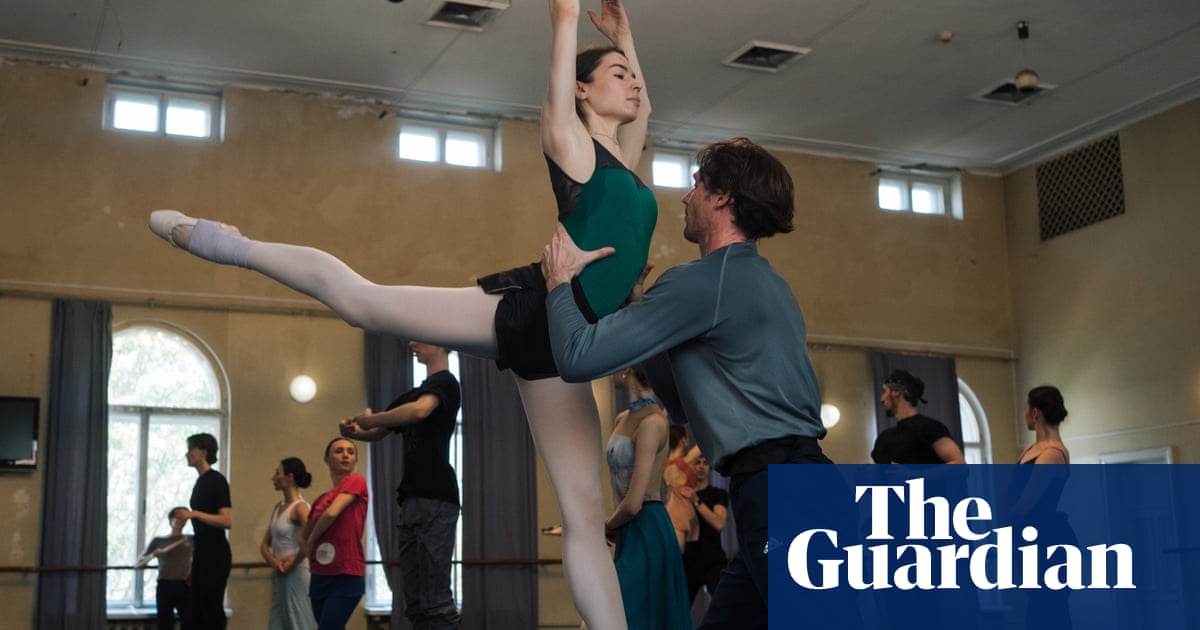One of the “most English of ballets” will be performed for the first time at theNational Opera of Ukraine in Kyivafter a boycott of the classic Russian repertoire, includingSwan Lakeand the Nutcracker.
Sir Frederick Ashton’s La Fille mal gardée, a celebrated romantic comedy, will be performed to a sell-out audience on Thursday afterUkraineturned away from the works of Tchaikovsky, Stravinsky and Prokofiev.
The production, which will run for at least five years in Kyiv, was made possible by fundraising in London by the former Ukrainian star of the RoyalBallet, Ivan Putrov, and the sculptor Antony Gormley. The ballet’s owner, Jean-Pierre Gasquet, has waived his fee.
Originally a French ballet by Jean Dauberval, Ashton’s choreography, first staged in1960, turned La Fille mal gardée into one of the best-loved English ballets, featuring slapstick humour, a maypole and traditional folk dance.
The Ukrainian government hasasked cultural institutions in the country and abroad to boycottballet productions by Russian composers and choreographers on the grounds that Vladimir Putin is seeking to use culture “as a weapon” and justification for the war.
The artistic director of ballet at the National Opera of Ukraine, Nobuhiro Terada, said the issue was sensitive, but that the turning point had come when dancers at the Donetsk Opera and Ballet theatre in Russian-occupied Ukraine performed the shape of a Z, a pro-war symbol, in the autumn of 2022.
“After that, Putin claimed that Tchaikovsky, Prokofiev, Stravinsky, all of them, belong to the Russian world and Russian people,” he said.
“After this story, the minister of culture of Ukraine at that moment, said ‘no more’. Politics and culture are different things. But at that moment, there were a lot of victims of this war, and we realised relatives of these victims, they don’t want to hear Tchaikovsky, Stravinsky and Prokofiev.
“It’s a very sensitive question. I’m not a politician, I have to accept an opinion of Ukrainian people. Tchaikovsky, he was in Kyiv, he lived in Kyiv, and Prokofiev was even born in Donetsk.
“Of course, we want to perform Tchaikovsky and a lot of performers they want it, and it needs to happen for the next generation, in my opinion. But today it’s not a good time to perform.”
The boycott is controversial even among the cast of the La Fille mal gardée, which tells the story of a young woman named Lise who is determined to be with a young farmer rather than her mother’s choice of dim-witted Alain, the son of a wealthy landowner.
Daniil Silkin, 29, worked as a combat medic in the Ukrainian army for the first 18 months of the war but will perform as Alain in the production thanks to a time-limited exemption on service for performers.
He said he did not agree with the boycott of the seminal works, which he described as a “big part of world ballet”.
“I don’t think the Ukrainian government was right,” he said. “I think they should say to the people that Tchaikovsky, Stravinsky and Prokofiev do not belong to Putin. They were of a very different time.”
Andrianna Shabaeva, 20, whose role is as one of the friends of the main female character, said she had not had the opportunity to perform the Russian classics because of the full-scale invasion three years ago.
“Maybe one day. But not before the Russians go away,” she said.
Terada, who came to live permanently in Ukraine without his parents in 1986 as an 11-year-old boy as part of a cultural exchange between ballet schools in Japan and the Soviet Union, said the boycott of Russian works had forced the opera house to look more widely for productions.
With international assistance, it has since performed 5 Tango’s by the Dutch choreographer Hans van Manen, Spring and Fall by John Neumeier and Alexei Ratmansky’s Wartime elegy.
Terada, who was appointed director in 2022, said: “Before the war, we didn’t have any opportunity to work with these famous names. They decided to help Ukraine and National theatre and ballet because of war.
“And thanks to Ivan Putrov and the other sponsors, we’ve got this production, La Fille mal gardée. It was impossible to get the choreography of Frederick Ashton. You need to pay. That is the reason that this Ukrainian theatre during last 50 years have had the same productions: Swan Lake, Nutcracker, Spartacus.
“I clearly understand – it’s not popular, what I’m going to say – but when war is happening, we need to use this opportunity and to get the best from the world, because all world is going to help Ukraine.”
The audience in Kyiv will have access to the coat room as a shelter during Russian air raids, but other inconveniences of putting on a show during a war are more difficult to overcome.
Putrov, whoseDancefor Ukraine event in London has helped finance the new production, said: “I think it was 60 men who were called up from the stage crew. I think they only have 19 left.
“La Fille mal gardée is a beautiful blockbuster, a classic that is sunny, that is the most English of the ballets, with a grand dame, pantomime, maypole, clog dance. It will lift the spirits. What are Ukrainians fighting for? They’re fighting for the way of life they want to live, and it’s very important that the spirit is sustained.”
